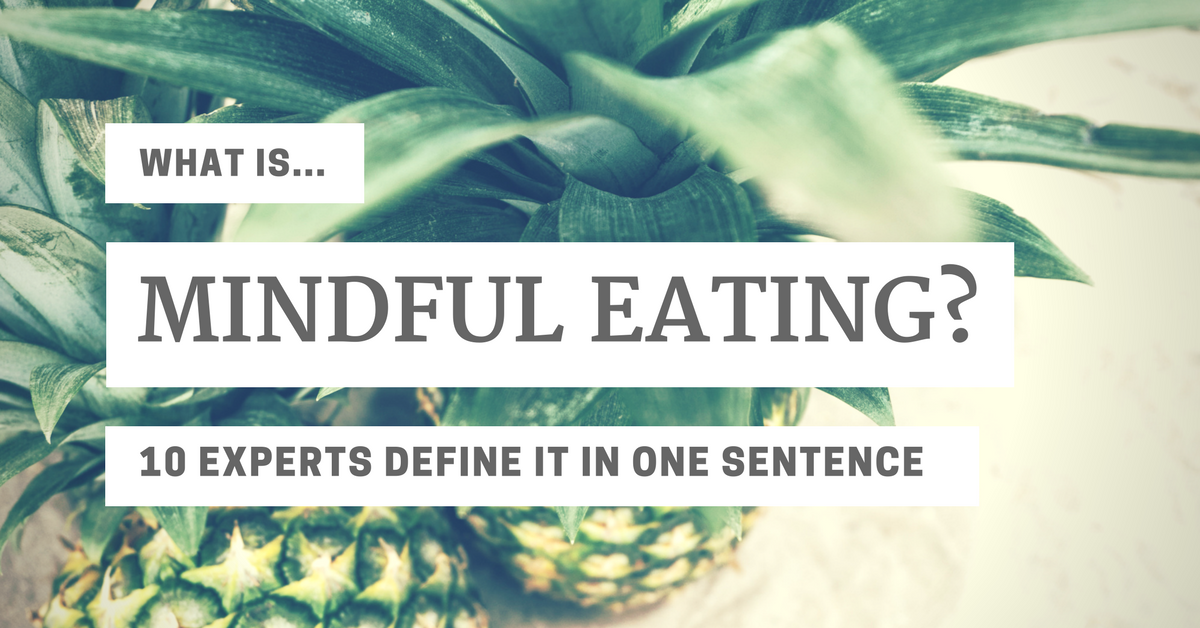What Is Mindful Eating? 10 Experts Define It In One Sentence
My Path to Mindful Eating
Mindfulness is a central part of my life these days, and it all started with food. I struggled for a long time with a balanced approach to eating, resulting in a long series of extreme diets. By the time I went to college, I had tried more diets than most 50 year old women: low-starch, keto, Medifast, macro-counting, calorie-counting, paleo, countless others I cant remember. It also lead me to a lot of failure by binge.
Nothing is less mindful than shoving food into your mouth as soon as you get home from school, hoping your mom wont notice how much is missing from the cupboard. On the other end of the spectrum, nothing is less mindful than enforcing Nazi-style food rules on yourself that prevent you from celebrating a friend's birthday with a slice of cake or just having a piece of whole wheat toast after a tough morning workout.
There's that old saying: "Eat to live, don't live to eat." Well, all that obsessing about food had my brain living to eat. And that's not a very positive psych way to live.
Fortunately, I stumbled upon mindful eating around my senior year of college. By then, I was eating fairly well - lots of protein, fruits, and veggies - but denying myself whole grains because I was drinking too much (and there just wasn't room in the calorie budget for both #pictureofhealth).
Mindful eating is a concept that has completely changed my relationship with food, and I'm eager to share it with others who may have struggled with some of my same challenges. There are so many definitions of the term, and everyone will have their most resonant. I'm hoping you'll find yours in the list of expert opinions below.
What is Mindful Eating?
- The Center for Mindful Eating: “Mindful eating is using all of your senses in choosing to eat food that is both satisfying to you and nourishing to your body.”
- Psychology Today: “Mindful eating involves paying full attention to the experience of eating and drinking, both inside and outside the body.”
- Zen Habits: “Mindful eating is learning to pay attention. Instead of eating mindlessly…you notice your thoughts, feelings, and sensations.”
- Foundation For A Mindful Society: “Allowing yourself to become aware of the positive and nurturing opportunities that are available through food selection and preparation by respecting your own inner wisdom.”
- Michelle May, M.D. of Am I Hungry?: “Eating with the intention of caring for yourself [and] the attention necessary for noticing and enjoying your food and its effects on your body.”
- Healthline: “Mindful eating is about using mindfulness to reach a state of full attention to your experiences, cravings and physical cues when eating.”
- Harvard Health Publishing: “Mindful eating means being fully attentive to your food—as you buy, prepare, serve, and consume it.”
- Psych Professionals: “Mindful eating uses the act of mindfulness, or being present, to help overcome eating problems in our increasingly busy lives.”
- Lexicon Of Food: “Mindful eating is the practice of cultivating an open-minded awareness of how the food we choose to eat affects one’s body, feelings, mind, and all that is around us.”
- Today’s Dietician: “Being aware of the nourishment available through the process of food preparation and consumption, choosing enjoyable and nutritious foods, acknowledging food preferences non-judgmentally, recognizing and honoring physical hunger and satiety cues, and using wisdom to guide eating decisions.”
And since often the people around you have the biggest influence on your life, some pretty sage advice from my very fit boyfriend: "Listen to your body. Don't eat when you're not hungry. Learn to want the things you need, and you can eat whatever you want."
How Eating Mindfully Changed My Life
I started at #8 (with problems), and it took me about six years to get to #10. Today, I ask myself before each meal, "What do you need to feel nourished right now?" That simple questions has had such a profound impact on my life. Sometimes the answer is, "Actually...nothing." Other times it's ice cream. A lot of times, it's veggies, protein, and whole grains.
Not only am I ten pounds lighter than I was in high school (or college, for that matter), I am not obsessed with food. I still love it and am concerned if my appetite starts to slip, but honoring my body's needs and my brain's desires (moderately, of course), has completely changed the way that I think about food for the better.
And finally, I used to have crazy stomach issues. I was bloated all the time, even when I hadn't eaten an insane amount of food in one sitting. When I started eating mindfully - which, in this case, was loving myself enough to stop putting pain-inducing food into my body - the bloating, acid, and discomfort decreased dramatically.
So that's mindful eating and why it's important to me. If you're just starting down the long road of eating issue recovery, I hope the above definitions serve as a solid foundation for your budding relationship with food. If you're already pretty healthy, but feel like there's always room for more mindful consideration, add one or more of these mental frameworks to your toolbox and I promise you'll get even more out of the food you already love.
Is mindful eating a helpful framework for you to think about food? I'd love to hear about some of your experiences with it. I'm going to be writing a lot more about mindful eating, including strategies for how to do it and recipes that help make it easier. Subscribe to the blog if you'd like to stay in the loop!
Up Next: Read Eating Mindfully On A Time & Money Budget


